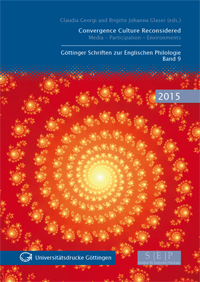Taking media scholar Henry Jenkins’s concept of ‘convergence culture’ and the related notions of ‘participatory culture’ and ‘transmedia storytelling’ as points of departure, the essays compiled in the present volume provide terminological clarification, offer exemplary case studies, and discuss the broader implications of such developments for the humanities. Most of the contributions were originally presented at the transatlantic conference Convergence Culture Reconsidered organized by the editors at the Georg-August-Universität Göttingen, Germany, in October 2013. Applying perspectives as diverse as literary, cultural, and media studies, digital humanities, translation studies, art history, musicology, and ecology, they assemble a stimulating wealth of interdisciplinary and innovative approaches that will appeal to students as well as experts in any of these research areas.
Publikationstyp: Sammelband
Sparte: Universitätsdrucke
Sprache: Englisch
Beiträge
-
1. Foreword (Seiten 7-9)
-
2. Reconsidering Convergence Culture and Its Consequences for Literary Studies (Seiten 13-29)
-
3. Mediating Meaning in Botticelli’s Primavera (Seiten 33-48)
-
4. The Enemy of Environmentalism: Struggles with Divergent Convergence (Seiten 49-63)
-
5. Performing Identities and Convergent Aesthetics in Contemporary Estonian Video Art (Seiten 65-76)
-
6. Translation and Convergence Culture: German Renderings of Uncle Tom’s Cabin (Seiten 77-91)
-
7. ‘Scribner’s Illustrated New Orleans’: Convergence Culture and Periodical Culture in Late 19th-Century America (Seiten 95-110)
-
8. Expanding Worlds: Neo-Victorianism, Fan Fiction, and the Death of the Author (Seiten 111-122)
-
9. Aspects of Victorian Serial Publication in Neo- Victorian Fiction: The Glass Books of the Dream Eaters and The League of Extraordinary Gentlemen (Seiten 123-138)
-
10. “When in Rome …”: Convergence Culture in Science Fiction Fandom (Seiten 139-158)
-
11. Reconsidering Transmedia(l) Worlds (Seiten 163-194)
-
12. Can Man with a Movie Camera Shoot Enemy Zero? Convergence and Transcoding in Michael Nyman’s Musical Scores (Seiten 195-207)
-
13. Converging Media and Modes: Digital Textuality and the Dissolution of Media Borders in Steven Hall’s The Raw Shark Texts (Seiten 209-220)





